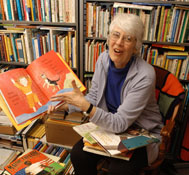 This Goodly Land
This Goodly Land
Betsy Hearne (October 6, 1942–present)

Other Names Used
- Elizabeth Gould: birth name
- Elizabeth Gould Hearne: married name
Alabama Connections
- Wilsonville, Shelby County: birthplace, childhood residence
Selected Works
- Hearne, Betsy. Eli's Ghost. Illus. Ronald Himler. New York: Margaret K. McElderry Books, 1987. For younger readers.
- Hearne, Betsy. Polaroid and Other Poems of View. Illus. Peter Kiar. New York: M. K. McElderry Books, 1991.
- Hearne, Betsy. Seven Brave Women. Illus. Bethanne Anderson. New York: Greenwillow Books, 1997. For younger readers.
- Hearne, Betsy. Listening for Leroy. New York: Margaret K. McElderry Books, 1998. For younger readers.
- Hearne, Betsy. Who's in the Hall?: A Mystery in Four Chapters. Illus. Christy Hale. New York: Greenwillow Books, 2000. For younger readers.
- Hearne, Betsy. The Canine Connection: Stories About Dogs and People. New York: Margaret K. McElderry Books, 2003. For younger readers.
- Hearne, Betsy. Hauntings, and Other Tales of Danger, Love, and Sometimes Loss. New York: Greenwillow Books, 2007. For younger readers.
Literary Awards
- Jane Addams Children's Book Award, Picture Books, Women's International League for Peace and Freedom and Jane Addams Peace Association, 1998, for Seven Brave Women
- Parents' Choice Silver Honor Award, Fiction, The Parents' Choice Foundation, 2003, for The Canine Connection: Stories About Dogs and People
Biographical Information
Betsy Hearne was born in Wilsonville, Ala., and spent her early childhood there. She grew up listening to the stories her mother told about their extended family. Hearne was taught at home by her mother for her first two grades. The family lived in an isolated area, and Hearne had no playmates. She began writing stories to amuse herself at an early age. The family moved to eastern Tennessee just before Hearne started third grade. She found it hard to make friends, and, to compensate, she read voraciously and continued writing her stories. Hearne attended the College of Wooster in Ohio, earning a BA in history in 1964. After graduation, she worked in a Wooster public library as a children’s librarian and storyteller. Hearne earned an MA from the Graduate Library School of the University of Chicago in 1968.
After library school, Hearne worked as a children’s book reviewer for Booklist magazine and taught classes in children’s literature at the University of Illinois at Chicago. In 1973, she became the editor of the children’s book section of Booklist. Hearne’s first book for children, South Star, was published in 1977. She has since published young adult novels, short story collections, and picture books, as well as two collections of poetry and a guide to children’s literature. In 1979, Hearne returned to graduate school, earning a PhD in 1985 from the Graduate Library School at the University of Chicago. From 1985 to 1992, she taught at the University of Chicago. In 1992, Hearne joined the faculty of the Graduate School of Library and Information Science of the University of Illinois at Urbana-Champaign where she teaches children’s literature and storytelling. She is also Director of the Center for Children's Books at the University of Illinois.
Interests and Themes
Betsy Hearne writes poetry and books for children and young adults. Her picture book, Seven Brave Women, is based on her mother’s stories about female relatives. Listening for Leroy has settings in rural Alabama and Tennessee which are similar to the places where Hearne grew up.
For More Information
Please check your local library for these materials. If items are not available locally, your librarian can help you borrow them through the InterLibrary Loan program. Your librarian can also help you find other information about this author.
There may be more information available through the databases in the Alabama Virtual Library. If you are an Alabama citizen, AVL can be used at your public library or school library media center. You can also get a username and password from your librarian to use AVL at home.
Reference Book Chapters and Encyclopedia Entries
- "Hearne, Betsy Gould 1942-"; Something About the Author. Vol. 146. Detroit: Thomson-Gale, . 127-131.
Reference Web Sites
- Betsy Hearne. 2006. Graduate School of Library and Information Science, University of Illinois at Urbana-Champaign. http://people.lis.uiuc.edu/~hearne/.
Photo by Thompson McClellan; courtesy of the Graduate School of Library and Information Science, University of Illinois at Urbana-Champaign; © Board of Trustees of the University of Illinois.
Last updated on May 30, 2008.